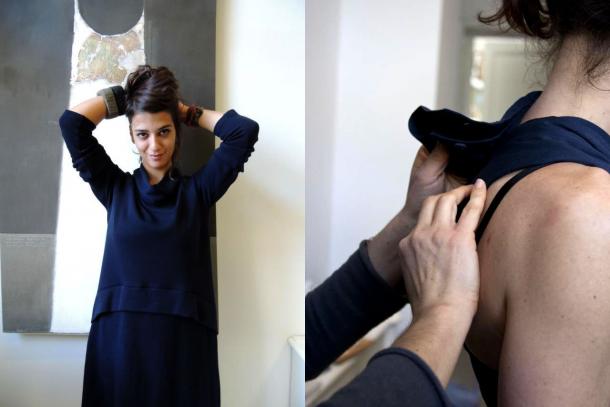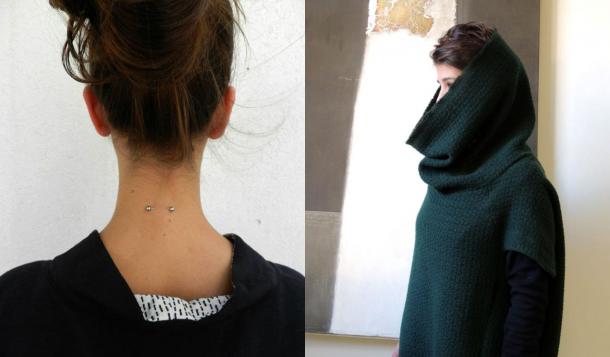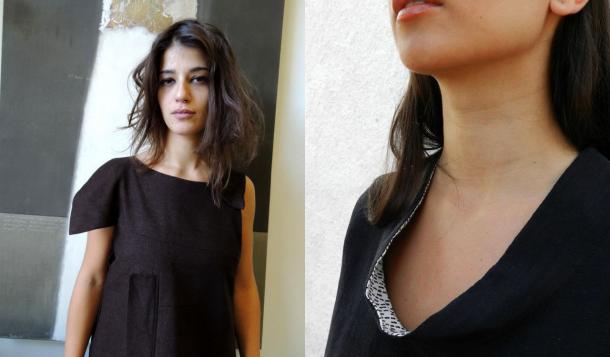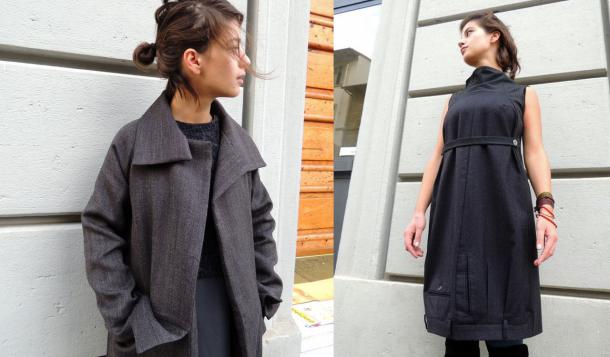UpCycling Clothing: Architect Turned Dressmaker in Florence
By Miriam Hurley
One of Italy’s greatest natural resources is the grinta – gumption, grit, get-up-and-go – of its women. A case in point is Mariantonietta “Marenna” Davoli, a Sardinian designer, tailor, and sole proprietor of Qualcosa è Cambiato, based in Florence. We sat down to talk with her about becoming an independent designer in Italy.
A self-taught maker of quirky, sophisticated, upcycled fashion, Marenna began as an architect who, as she puts it, recycled herself into a tailor-designer. The name Qualcosa è Cambiato (“Something has Changed”) refers to both the maker and the wonderful things made in this picturesque little Florentine shop. Transforming a pair of men’s formal pants into the front panel of smart grey dress for example, she makes pieces that are eco-conscious, original, and full of verve, like Marenna herself.

How did you go from the original inspiration to the reality of starting a business?
During a time of crisis in my life, ho fatto di necessità virtù as we say [I made a virtue out of necessity]. I’d learned to sew as a child, but had a lot to learn on the sewing machine. I was sewing my son a Spiderman costume for Carnevale and got the idea to try to make new outfits out of old clothes in my own wardrobe, like I’d seen done. I was pleased with the results. I practiced my sewing skills, turning the living room into a workshop with heaps of clothes everywhere, and sewing became a true passion for me. Hours would pass while I was sewing and I wouldn’t even feel hungry, thirsty, or the urge to smoke!
Online, I found a great organization here in Florence, called Vivaio delle Imprese, that helps start-ups and I took a short entrepreneurship course from them. They partnered with the City of Florence to give us a free booth at the Mostra dell’Artigianato, a huge local annual handicrafts trade fair. They told me that because many thousands of people go through the fair, I would have to have enough pieces to show. I made 40 pieces in six weeks! I sold almost everything. I had to ask customers to leave their purchases marked “sold” until the end of the fair, so that my booth wouldn’t look empty. And that was the beginning.

Tell me about your process for upcycling old clothes.
Friends, customers, and neighbors bring me their old, sometimes vintage, clothes. I choose what I want and wash them. Sometimes I use the whole garment; sometimes just parts. People give me a lot of scraps too. Then, I create freely. One garment might suggest another one to me. Sometimes an idea comes by chance, with a piece of fabric falling on the ground on top of another. I design right on the mannequin, though I am starting to make patterns too… I’m learning and growing! Sometimes customers bring me one of their favorite garments for me to make a re-purposed design just for them, but that doesn’t always turn out, so I do it less and less. I work best when I can work freely.
What are your inspirations? Would you say that your native island, Sardinia, and your adopted city, Florence, have shaped your style?
Everything can be an inspiration. My education as an architect was, of course, essential. It’s also important to see and be surrounded by new things. It’s an enormous privilege to be surrounded by beauty. This is what gives Italian designers such an advantage.

Change is in your business’s name: Qualcosa è Cambiato. But in Italy there can be many obstacles for independent designers yet to change, whether bureaucracy, the economy, or the pessimism of this crisis era. How do you overcome these obstacles?
It’s true that bureaucracy, the difficulty of getting credit, and tax pressures often don’t help if you want to start your own business here, to try to take a different independent path. I haven’t done everything I could yet. For example, if I wanted to share a shop in the city center with other artisans, it would be a problem.
If the current Italy were a used garment and you wanted to change it to make a piece as beautiful, enduring, and stylish as your work, what would you do?
This crisis has shown us that many things have to be changed, that the current model doesn’t work, fundamentally in terms of sustainability. We’ve been under the illusion that we could all be rich and all consume whatever we wanted, but now we’re seeing that it’s not true. We’ve learned to think we need a huge amount of things, while we’ve actually further impoverished the people that we keep on exploiting. Then everything fell apart, so we have to take a step back.
I think that the change has to start with each of us. We can’t just expect change of others. We have to change our lifestyles, get used to consuming less, notice waste and contain it or reuse it. We need to take on issues that are about ethics and honesty in a deep sense. That’s part of the ethics of Qualcosa è Cambiato.

What’s the future of Qualcosa è Cambiato?
Right now, I do almost everything by myself. I’m very happy with the level I’ve reached creatively and technically. But this isn’t enough to run a business. I need a lot of others involved and working with me, as a team, not necessarily led by me.
I think you grow when you are in a group and have a dialogue with others. Otherwise you get self-referential. Now I’ve had this experience on my own and I need to direct myself outwards, both for sales channels and for production. I would like to have partners and collaborators. I haven’t been able to find them yet, but the time has come to do it.
Qualcosa è Cambiato
Via Sercambi, 5/7r
50133
Firenze, Italy
Tel: [+39] 347 714-2876
web: http://www.qualcosaecambiato.it
email: info@qualcosaecambiato.it
